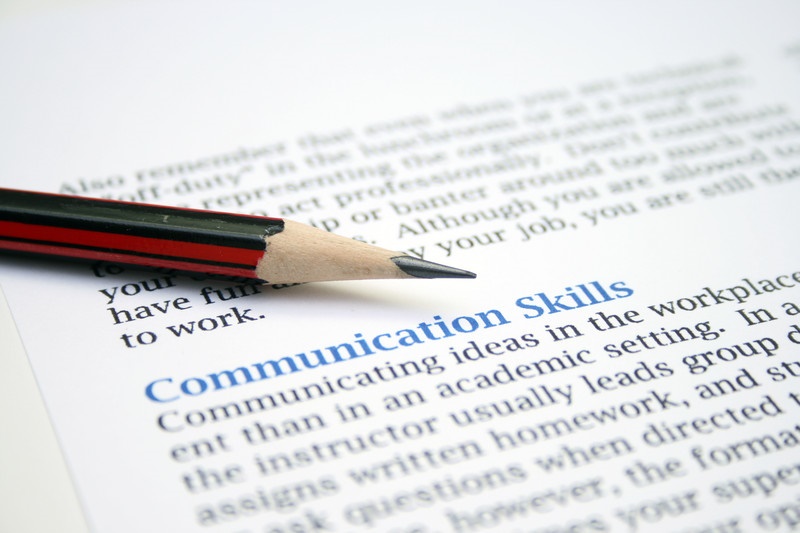Communication is reliably cited as one of the most—if not the most—significant factors to building and maintaining healthy relationships. According to the PBS program The Emotional Life:
“How couples behave when solving problems together or arguing can predict the character and success of their relationship. A raised eyebrow, a hand on the arm, or a greeting all may seem like small things, but research shows that the quality of everyday interactions can make or break a relationship.”
Similarly, communication skills are just as important at work: one 2014 survey of roughly 600 employers found that communication skills are the most in-demand skill set among employers. In fact, of five leading skill sets employers consider most important when making a hiring decision, communications skills top the list.
From preserving healthy relationships to getting hired to being promoted, communication affects almost every aspect of our lives. Striving to enhance our communication skills, then, is not a bad place to start if we desire to make some positive changes.
How to become an effective communicator
Coming to be an effective communicator is not complicated, but it will call for some basic skills and the willingness to practice.
A good place to start is to realize that the goal of any communication situation is a genuine, open-ended exchange of ideas where all parties can be heard and appreciated. This necessitates assertive and articulate speaking abilities, but, just as critically, requires robust listening skills.
The fact is, listening skills may be the most significant part of communication. The reason is simple: if you are unable to understand what is being said, you won’t be able to formulate a relevant and significant response. This failure to understand is the root cause of countless misunderstandings, arguments, and bad feelings.
Improving listening skills, then, is the single most significant thing you can do to become a superior communicator. And while active listening is often difficult on its own, hearing loss makes things even harder.
Hearing loss and the obstacles to active listening
Active listening calls for dedicating all attention to the speaker. Only by completely understanding the communication can you craft a relevant and significant response, and that’s why inadequate speakers are nearly always preoccupied listeners.
But what brings about the distraction?
Here are four typical sources of distraction and how hearing loss has a tendency to make things worse:
Distraction # 1: Stress
If you’ve ever been overly stressed or anxious, you understand how challenging it can be to pay attention. You’re more inclined to be focused on your own thoughts and feelings rather than on the speaker’s, and you’re likely to miss out on crucial non-verbal signals and to misinterpret what other people are saying.
With respect to stress, hearing loss by itself is a significant source. You may become anxious about missing important information or coming up with awkward responses. And, the struggle to hear speech in the existence of hearing loss is a source of stress and strain itself.
Distraction # 2: Lack of focus
Active listening is challenging because our minds have the natural inclination to wander. You can’t simultaneously pay attention to the speaker and daydream, check your email, text message, and prepare what you’re going to say next. Remaining within the present moment and focusing on the speaker is the only way to pick up on the subtle details of the speaker’s communication.
Hearing loss produces a lack of focus because it removes you from the present moment. If you’re attempting to figure out what the speaker just said, you’re also losing out on what they’re saying at the moment. The continual catch-up almost guarantees that you’ll never properly understand the message.
Distraction # 3: Misunderstanding
Stress and lack of focus can both lead you to misread the message. This presents the possibility of you becoming upset or annoyed with a message that the other person never actually intended to send.
This at the very least wastes time and in the worst case produces bad feelings. Not to mention the irritation of the person who is persistently misunderstood.
Distraction # 4: Lack of confidence
If you lack self-confidence, you’ll find it difficult to assert yourself while interacting. You’ll likely also be preoccupied with what the other person thinks rather than on the content of what they’re saying.
Hearing loss makes things worse, as you can imagine, because your misinterpretations could be perceived as a sign that you just don’t comprehend the message. If you’re frequently asking for clarification on simple points, it makes it hard to feel confident enough to be assertive.
How hearing aids can help
Coming to be a better communicator requires becoming a better listener, but how can you become a better listener if you have hearing loss? You have a few options, but because hearing aids have advanced so far with respect to identifying and amplifying speech, they really are the ideal solution.
Modern digital hearing aids have a variety of amazing features made exclusively for speech recognition. Many hearing aid models have background noise suppression, directional microphones, and advanced digital processing so that speech comes through loud and clear.
Without the need to strain to hear speech, you can focus all of your efforts on comprehending the message. Then, as you become a better active-listener, your self-confidence, assertiveness, and speaking skills will all take care of themselves.
If you have hearing loss and you’re ready to start strengthening your distraction-free listening skills, schedule your hearing test today.

